1 Million Youth Actions Challenge – Call for Proposals: 6 selected projects
In June 2023, the International Secretariat for Water (ISW) and 1 Million Youth Actions Challenge (1MYAC) launched the “1 Million Youth Actions Challenge – Call for proposals. We are pleased to announce that 275 projects were submitted from over 55 countries. This response demonstrates the growing need for innovative financing mechanisms for young water leaders in the water and climate sector. All over the world, youth are mobilizing and implementing creative solutions to build a sustainable future for their communities.
This call for proposals has been designed to support the implementation of youth-led initiatives related to SDG 6: clean water and sanitation , SDG 12: responsible consumption and production, SDG 13: climate action & SDG 15: biodiversity and to enhance the young leaders’ capacities as actors of change in the water and climate sector. The 1MYAC initiative is an initiative of the Swiss Agency for Development and Cooperation.
Selected projects
As part of the 1 Million Youth Action Challenge – Call for proposals, 6 projects from 5 different countries have been selected by our jury to receive financial and technical support. More than half of the projects selected are led by young women, and all are directly related to one or more of the 4 SDGs targeted by this call for projects. All projects are led by 1MYAC Ambassadors.
The jury for this call for projects was composed of inspiring young professionals and senior experts: Jorge Arnand (Program Manager, César Ritz Colleges), Maxime Teblekou (Global Water Partnership – Afrique de l’Ouest), Anita Singh (1MYAC Ambassador), Laila Villanueva (1MYAC Ambassador) and Manishka Kistamah (Digital Communications Manager, Sanitation Water for All).
1- Cameroon: Natura Project
Project leader: Sama Lesly Tankfu
Water hyacinth, an invasive aquatic plant that grows rapidly and covers water bodies, poses a number of problems in the region’s water bodies: reduced oxygen levels, massive fish mortality, destruction of aquatic ecosystems and native plants, etc. The primary objective of the Natura project is to develop a comprehensive strategy for the effective control and utilization of water hyacinth in order to mitigate its negative impacts while harnessing its potential benefits.
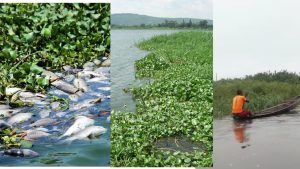
2- Uganda: Fuel her with waste
Project leader: Nalukwago Naswirah
The aim of this project is to promote the empowerment of women through the production and use of charcoal briquettes and fire starters, made from agricultural and organic waste. The utilization of agricultural and organic waste as raw materials for the production of charcoal briquettes will reduce the pressure on natural forests, promoting responsible consumption and sustainable production practices. By creating an innovative value chain that empowers women entrepreneurs, the project aims to enhance gender equality and economic opportunities for women in the target communities.
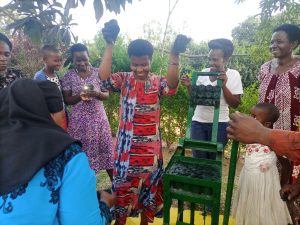
3- Paraguay: Agricultura Urbana
Project leader: Alberto Núñez
The project aims to work on creating vegetable gardens and teaching composting to 150 women and young people from the Bañados de Asunción communities, so that these families have the knowledge they need to produce their food organically. This community was chosen because it needs to grow food to improve its quality of life, and because it has time and space at home, unlike other urban or rural areas.
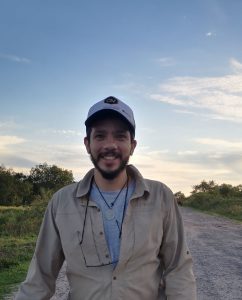
4- Uganda: Happy girls and young mother reusable sanitary pads
Project leader: Kanshabe Pamellah
The aim of the project is to improve the menstrual health and well-being of women and girls, by ensuring that they have access to comfortable and hygienic reusable sanitary pads. By offering reusable alternatives to disposable pads, the project aims to improve access and affordability, enabling more women and girls to manage their periods with dignity and confidence. The project will also help to reduce the amount of menstrual waste associated with disposable sanitary towels.
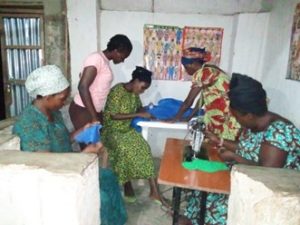
5- Indonesia: Save our sea: Addressing Faecal Contamination in Coastal Area of Bandar Lampung
Project leader: Cindy Dwi Islami, Youth Sanitation Concern
In the coastal area of Bandar Lampung, 12 households, including at least 80 people, have been targeted by the project. The buildings in which the households live are located above sea level. As their toilets have no septic tanks, this results in toilet waste being discharged directly into the sea. The project aims to establish a fecal waste treatment system for these households, using Tripikon-S septic tanks, a technology that is effective, easy to work with at an affordable cost.
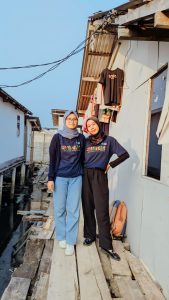
6- Benin: Confection et Installation des pots diffuseurs dans les localités rurales de Guéné et Kérou
Project leader: ALI WAGANA OSSENI Asmahou, WATER4ALL
The project aims to facilitate access to drinking water in the rural communities of Guéné and Kérou in Benin, which are comprised of over 20,000 inhabitants, by installing diffuser pots. A total of 30 diffusers will be manufactured and installed in heavily-used wells. To achieve this, 18 girls and 12 boys will be trained in the manufacture and installation of diffuser pots. The objective of this project are to reduce water-related diseases, ban the use of firewood to boil water, and reduce the domestic chores of women and girls in marginalized rural areas. To achieve this, the team plans to install diffuser pots in wells that are heavily used in the localities of Guéné and Kérou. This low-cost device will enable the water to be treated. Young people aged between 15 and 30 will receive practical training in the manufacture and installation of the diffuser pots.
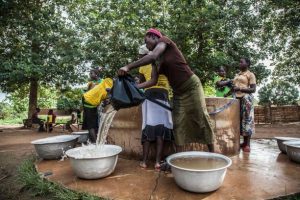
Next steps
The implementation of the projects has already begun! We invite you to visit the project pages to see their progression and their impact on local communities.
This call for projects is coordinated by the International Secretariat for Water (ISW) thanks to the financial contributions and collaboration of the Swiss Agency for Development and Cooperation and l’Agence de l’eau Artois-Picardie (AEAP).

